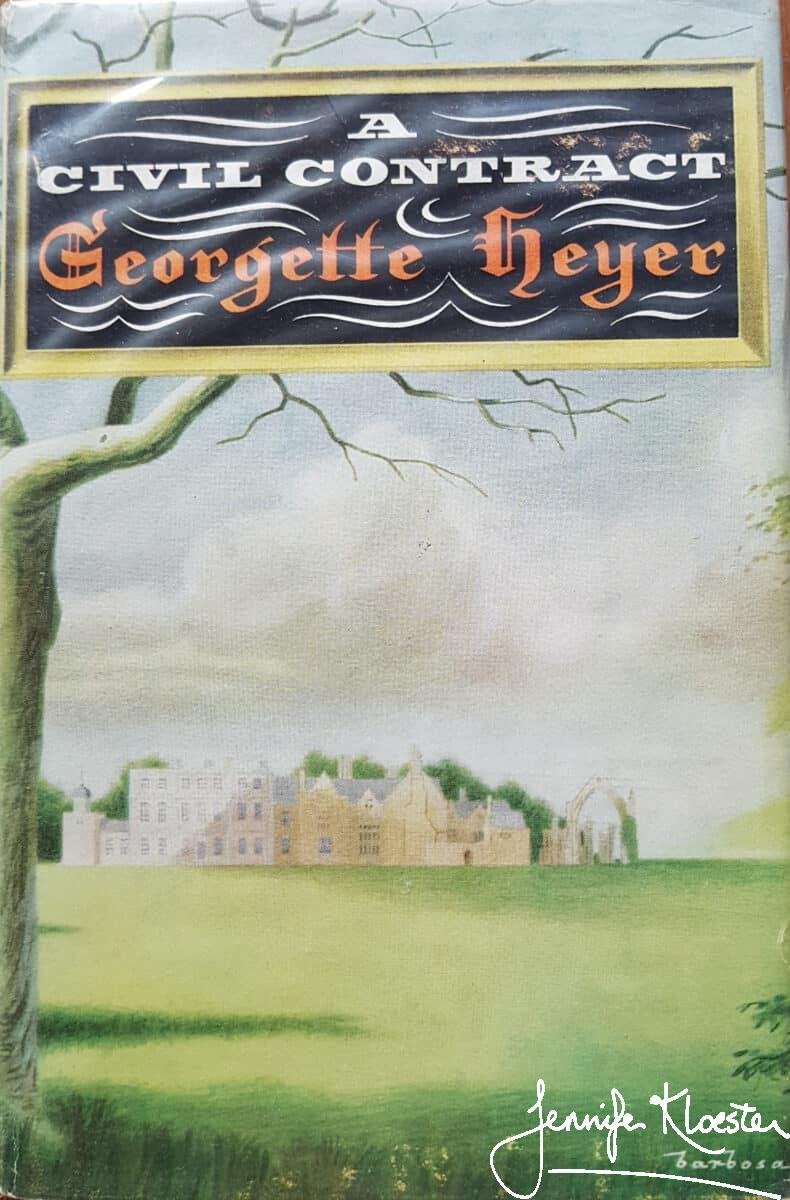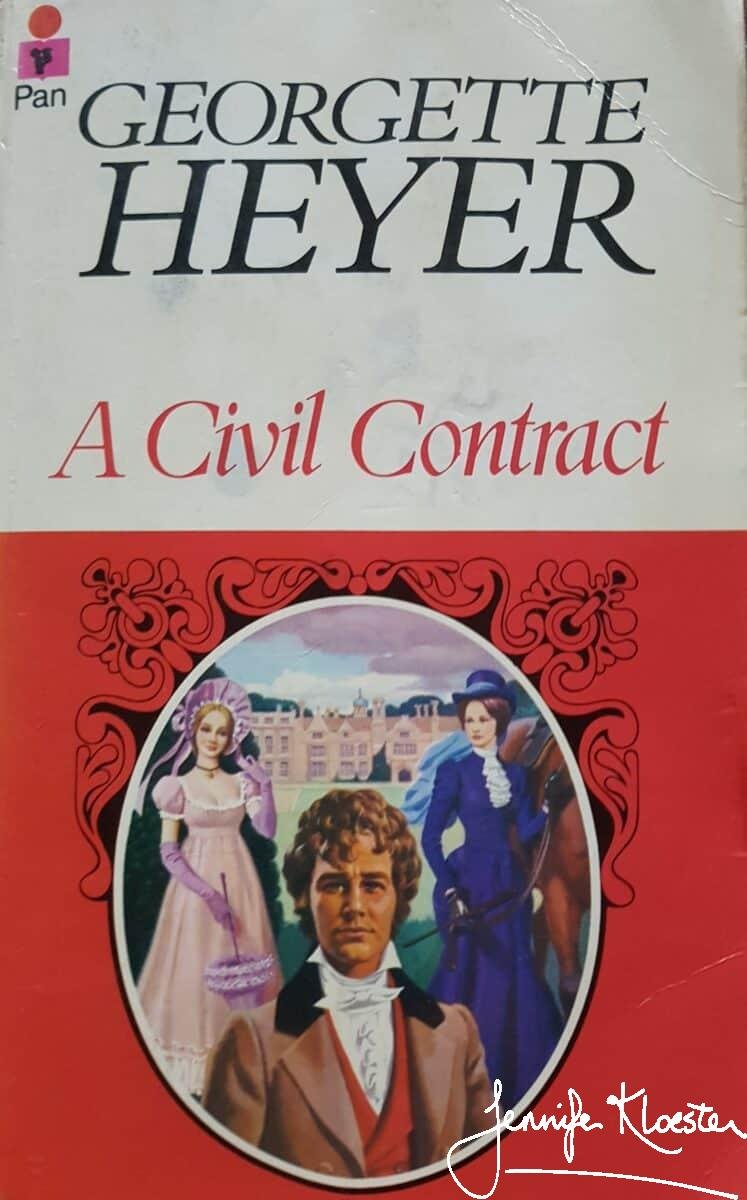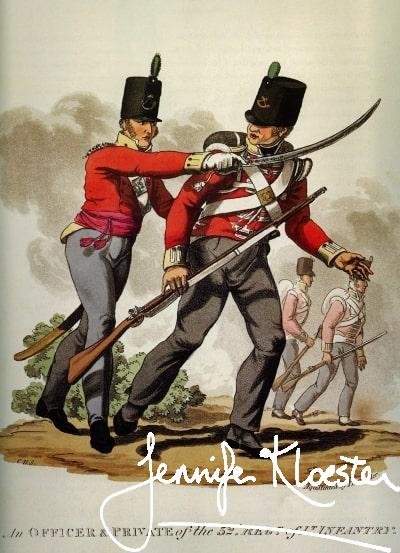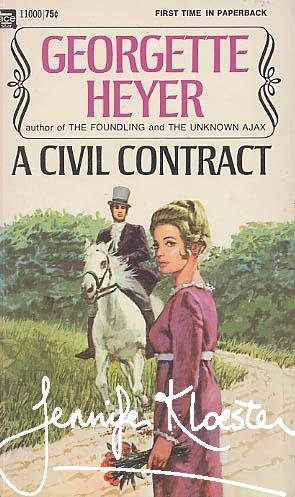
First, a confession
First, a confession: the first time I read Georgette Heyer’s 1961 novel, A Civil Contract, I didn’t really like it and, unlike Heyer’s other novels, it was some years before I reread it. When I did read it again, I discovered how much I had missed on that first encounter. Since then, every subsequent re-read has delivered new and enriching insights. This, I now know, is a common experience among Heyer readers: the favourite novel of one’s teens or young adulthood may not be the favourite in one’s more mature years. Things invisible to the youthful eye can easily move to centre stage as life brings us new and often salient experiences. One of the hallmarks of Heyer’s genius is this ability to write books that shift and change with age. New understandings and fresh perceptions of her novels’ characters and their relationships is one reason why her books continue to sell almost fifty years after her death. Today, A Civil Contract is one of my absolute favourite Heyer novels and one to which I frequently return for its flawed hero and truly valiant heroine. It is a deeply emotional book and one in which Heyer gives full rein to her powers of observation and her understanding of human nature. A story about class, wealth, desire, and the power of love, it has a bittersweet romance at its centre that sometimes divides readers in their response to the book. This is a book with an unusually (for Heyer) specific timeline and a story that reflects many of the realities of social life during the Regency – particularly attitudes to class and the consequent social divisions. It is superbly handled with a perfect blend of history, humour, pathos and emotion. In many ways A Civil Contract is Georgette’s most mature work. In terms of its literary merit it sits high in the canon beside her other great achievements including (among others)These Old Shades, Venetia, Sylvester, The Unknown Ajax, Cotillion, The Talisman Ring, Friday’s Child, Black Sheep and Frederica.

“I have a book germinating in my head”
Georgette did not publish a novel in 1960. Instead she published Pistols for Two – an anthology of her Regency short stories. She had undergone surgery for a benign breast tumour late in 1959 and her elderly mother had also needed a great deal of support which made Georgette’s agent, Joyce Wiener’s, idea of an anthology very welcome. Pistols for Two had met her eager fans’ demand for their “annual Georgette Heyer” and given the author a much-needed respite from writing. But, by November 1960, she wrote to her friend and publisher, A.S Frere to tell him that “I have a book germinating in my head”. At some point she must have been reading the seventeenth-century polymath, John Selden’s famous book, Table Talk, which his secretary had published in 1689. Among Selden’s many aphorisms and witty remarks was the statement that “Marriage is nothing but a civil contract”. It is from this that Heyer took the title for her new novel. Halfway through November, she again wrote to Frere to inform him that:
I think the next effort will be A Civil Contract – but this information is not yet for publication. I have a book germinating in my head, but I haven’t finally decided to write it. If I do write it, it will be neither farcical nor adventurous, & will depend for success on whether I can make the hero as charming as I believe he was! And also, of course, if I can make a quiet story interesting. The period would be 1814-1815, & the culminating point the financial panic in London over Waterloo. I have always had a slight yen to do that – & to see Major Percy driving in a hired hack to Carlton House, with the two Eagles sticking out of the windows. I’ll let you know definitely in a week or two.
Georgette Heyer to A.S. Frere, letter, 15 November 1960.

Georgette’s charming hero
Heyer’s charming hero is 26 year-old Adam Deveril, a captain in the 52nd Regiment of Foot and a veteran of the Peninsular Wars. Until the unexpected death of his father, Bardy, Viscount Lynton, Adam has spent much of his adult life in the army and abroad. Called back to England to take his place as the new head of the family, the young viscount is appalled to discover that his charming, yet profligate father, has played fast and loose with the family fortunes and they are on the brink of bankruptcy. Adam is a man of steadfast honour, kind, practical and gentle, with a charming smile and endearing personality; he is also in love. Wounded the previous year and sent home for surgery and convalescence he has lost his heart to the beautiful Julia Oversley, Lord Oversley’s enchanting daughter. Unfortunately the lack of money means that Adam must give up his dream of marrying Julia and instead decide how to pay off his father’s many debts and provide for his widowed mother and two sisters. The only solution appears to be to sell his assets including the family estate of Fontley Priory, home of the Deverils since 1540. An alternative solution, put to him first by his man of business and second by Lord Oversley, is for Adam to marry an heiress. However, the idea as put to him by Julia’s concerned father fills Adam with repugnance:
“if you whistle down the wind the best chance you’ll ever have offered you to save Fontley, provide for your sisters, and bring yourself off clear of debt, I shall think so much the worse of you that I shall be glad, instead of sorry, that you’re not my son-in-law!”
He saw Adam stiffen, and said in a milder tone: “I know it’s a mighty hard thing to do, and not the match anyone would have chosen for you, but the ugly truth is, boy, that you’re in the devil’s own mess! I say with all sincerity that you owe it to your name to seize any honourable chance that offers of bringing yourself about.”
“Honourable?” Adam ejaculated. “Selling myself to a wealthy Cit’s daughter? Oh, no! Not myself: my title!”
“Pooh! No need for any Cheltenham tragedies! It’s a fair bargain, and one that’s being struck more often than you know.”
Georgette Heyer, A Civil Contract, Pan, 1973, p.55.

A question of class
In many ways A Civil Contract is a book about class. Georgette had herself grown up in a socially hierarchical society with an upper class who considered themselves superior in many ways to those born lower down the social ladder. She knew firsthand the attitudes, contradictions, snobberies, hypocrisies and assumptions endemic in a highly class-conscious society and she depicts these to great effect in A Civil Contract. The novel is one of her most nuanced, for each character is flawed and complex. A superficial reading might lead readers to think that Heyer is promoting the idea that class carries with it certain inevitabilities: that those born to the upper class have “finer sensibilities” than those further down the social ladder, that the “well-born” are schooled in controlling their emotions and that their breeding means they will always be well-mannered no matter the circumstances. As in Austen, however, a close reading reveals clear dichotomies throughout the novel. Nothing is clear-cut and first glances can be misleading. The beautiful, well-born Julia has little control over her feelings and, despite declaring her love for him, does not hesitate to cause Adam emotional distress, whereas plebeian Jenny never fully confesses her love for Adam to anyone but constantly suppresses her emotions for his benefit. The Dowager feels herself infinitely superior to the Chawleighs and even shudders in their presence but she is hypocrite enough to accept their money if it will secure Fontley and enable her to live comfortably for the rest of her life. While Mr Chawleigh’s working class origins apparently make it impossible for him to understand Adam’s “finer feelings”, he is one of the book’s most laudable characters. Where Adam’s own father “so much preferred the Prince [Regent’s] society to that of his family that very little of his time was spent at home”, Jenny’s papa is devoted to his daughter, fiercely protective, generous, affectionate and thoughtful and wants only what is best for her. Mr Chawleigh’s “vulgarity” is constantly offset by his intelligence, generosity and insight. Adam’s breeding does not make him superior to Jenny. Indeed, Jenny Chawleigh is one of Heyer’s most moral characters and there are many moments when her integrity and honour exceeds Adam’s. There is real balance here and throughout A Civil Contract Heyer does a superb job of depicting the complexities of character and plot. Class is not the sole indicator of a person’s worth.

“A delicious, human and unromantic book”
Jane Aiken Hodge called A Civil Contract “a delicious, human and unromantic book”, but for those who believe in friendship as the best foundation for a lasting relationship then there is indeed a romance to be found within its pages. More on this aspect of the novel next week.





3 thoughts on “A Civil Contract – hidden depths Part 1”
Great opener. I hope you will get into the other marriages portrayed in the book.
Great opener. I hope you will get into the other marriages portrayed in the book.
Thank you so much, Melinda. I’m glad you liked it. Once I’ve finished the last three book blogs (Charity Girl is next), I have a series of topics that I’ll write about each month. Thanks for posting.